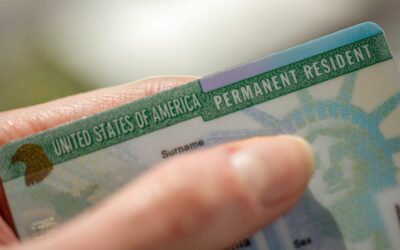A spouse of a U.S. citizen typically gets their conditional residency for 2 years if the green card was issued within two years of marriage to the U.S. citizen. During the 90-day period prior to the expiration of conditional residency, the U.S. citizen spouse and the spouse with conditional residency must apply to remove residency status by filing a petition with immigration authorities using Form I-751. Usually, couples submit this form together, because the purpose of the form is to show the immigration authorities (USCIS) they are still together as husband and wife. The I-751 application is analyzed to determine if the marriage was entered into in good faith, out of love, and for the purpose of living together as a couple. When the form is filed on time, USCIS automatically extends conditional residency for one year to process the application. This will allow you to travel and continue working. If the form is not filed on time, Immigration Law requires that conditional residency expire automatically and the person is out of status – or illegal without legal residency, without a work permit, and accumulating unlawful presence in the U.S. What To Do If You Are Divorced If You Are Divorced From Your U.S. Citizen Spouse You Must File I-751 At A Time Asking for a Waiver or sorry for doing the application without the spouse. USCIS can still approve the application if they are convinced that the marriage was in good faith and that it was not a marriage due to fraud (or papers.) These applicants will need to submit a final decree of divorce, as well as proof that the marriage was authentic. Allegations of Abuse, Mistreatment or Extreme Cruelty USCIS may also approve the application if it can be proven that the resident was abused during the marriage. The person who entered into a marriage in good faith but who has been mistreated or subjected to extreme cruelty by the U.S. citizen may file an I-751 application without the signature or support of the citizen spouse.These applications require proof of abuse or cruelty, for example, police reports, and evidence of extreme hardship if the applicant is denied permanent residency. In any case, if you are in this situation, it is highly recommended that you hire an immigration attorney experienced in these types of cases. If the form is not presented well prepared with all the requirements, there is a danger of losing residency and ending up in deportation proceedings.The consequences of denying a petition can be devastating. It is worth the cost of a good immigration lawyer. OTHER POINTS OF THE I-751 APPLICATION Death of U.S. Citizen Spouse Aliens whose U.S. Citizen spouse dies while on parole can still file an I-751 Application with a waiver application.The applicant must present USCIS with evidence that the marriage was entered into in good faith, of love, and that the couple established a life together from the time of adjudication of the application for residency (I-485) and until the time of the death of the U.S. Citizen spouse.The applicant must also include a copy of the death certificate in the application. Applying for U.S. Citizenship It usually takes about two years for the Immigration and Naturalization Service (USCIS) to approve Application I-751. Meanwhile, the U.S. citizen’s spouse is delayed in applying for naturalization, although he or she is eligible to file an application for citizenship two years and nine months after the initial grant of conditional residency. Due to the huge delays in the I-751 Application process, the foreign spouse wastes time for the purposes of filing a naturalization application. But it is permissible for a conditional resident to apply for naturalization, while an I-751 Application is pending with USCIS. As a result, spouses with conditional residency can apply for U.S. citizenship when they are eligible at 2 years and 9 months from the date of receiving conditional residency. This is the case even if Application I-751 is still pending. If the naturalization interview comes before a result with Application I-751, the application for citizenship cannot be denied because the I-751 is pending. Most likely, the official naturalization will put the application on hold until I-751 approval. —————————————————————– Documentation Proving bona fide of marriage In any situation discussed in the above, you must prove that your marriage is (or was) in good faith, and that it was not a farce to obtain the green card (Permanent Residence.) You must gather and photocopy all kinds of evidence proving that the marriage was legitimate. Do not send originals, just good copies. The following is a list of evidence that should be included in the application.
- Wedding invitations, church certificates, or other reliable documents showing the required relationship.
- Bank accounts in the name of both.
- Credit card accounts in the name of both.
- Membership in clubs or associations in the name of both.
- Federal and state taxes on behalf of both.
- Credit cards, health insurance cards, or other types of insurance that show the same account number.
- Photographs of you and your spouse before and during your marriage, wedding photographs, preferably those that are with family, parents and other relatives of both families. If the camera does not automatically insert the date, write the date the photo was taken and a brief description on the back of the photo, or below, if they are photocopies
- Don’t send videos.There will be no stop time to see them.
- Copies of letters and/or emails between you.
- Phone bills that show your conversations.
- Car registration showing ownership and/or addresses in the name of both.
- Lease agreements or mortgages showing that they have lived together and/or have rented or purchased property in the name of both.
- Receipts for gifts (such as flowers, jewelry, art, sweets etc.) that you have purchased for each other
- The birth certificate of your mutual child(ren) or a medical report stating that you are pregnant.
- Hotel and airline receipts showing those who have traveled together or to visit each other.
- Letters from friends or family to each or both of you, mailed to an address where you live together.
- Utility bills (electricity, water, telephone, etc.) in the name of both.
- Proof that one spouse has made the other a beneficiary in their life or health insurance or retirement insurance.
- Auto, health, or life insurance that has the name of both on the policy.
- A car title or other title deed showing that the property is in the name of both of you.
- Copies of Christmas cards or other holiday cards addressed to both of you.
- Other photos of the two of you that help prove your marriage.





